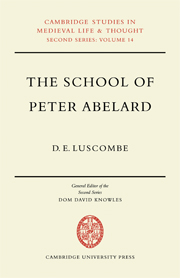Book contents
- Frontmatter
- Contents
- Preface
- List of Abbreviations
- I The Literary Evidence
- II Abelard's Followers
- III The Diffusion of Abelardian Writings
- IV The Condemnation of 1140
- V The Theological Writings of Abelard's Closest Disciples
- VI The School of Laon
- VII Hugh of St Victor
- VIII The Summa Sententiarum
- IX Abelard and the Decretum of Gratian
- X Abelard's Disciples and the School of St Victor
- XI Peter Lombard
- XII Robert of Melun
- XIII Richard of St Victor
- XIV Conclusion
- Appendices
- Bibliography
- Index of Manuscripts
- General Index
XIII - Richard of St Victor
Published online by Cambridge University Press: 05 November 2011
- Frontmatter
- Contents
- Preface
- List of Abbreviations
- I The Literary Evidence
- II Abelard's Followers
- III The Diffusion of Abelardian Writings
- IV The Condemnation of 1140
- V The Theological Writings of Abelard's Closest Disciples
- VI The School of Laon
- VII Hugh of St Victor
- VIII The Summa Sententiarum
- IX Abelard and the Decretum of Gratian
- X Abelard's Disciples and the School of St Victor
- XI Peter Lombard
- XII Robert of Melun
- XIII Richard of St Victor
- XIV Conclusion
- Appendices
- Bibliography
- Index of Manuscripts
- General Index
Summary
Richard of St Victor (d. 1173) seems to exert an ever increasing fascination over students of the theological literature of the twelfth century. He was most active as a writer in the fifties and sixties, which were no period of calm, yet, daring and influential as he was, he, like Hugh, engaged in no known public controversy and aroused no recorded antagonism.
Recent historians have been unanimous in underlining Richard's unusual sense of proportion. Formerly B. Haureéau described Richard and other Victorines as mystics who had turned their backs upon philosophy, while another writer, T. Heitz, reproached Richard for being too influenced by Abelard's excessively rationalist appeal. But more recent writers have almost without exception praised in Richard the admirably balanced union of scholasticism and mysticism.
In some respects Richard approaches theological speculation as a philosopher, moving through the sensible to the world above sense and proving the Trinity by an analysis of the notion of charity. He is rightly considered an important figure in his own right in the history of medieval philosophy. In the De trinitate he is conscious of the possibilities of equivocity: ‘utrobique dictio una, sed ratio nominis diversa’. A master of allegory and famous as the author of the two Benjamins, Richard was also a technical expositor of the literal difficulties found in Scripture and the author of an Expositio difficukatum suborientium in expositione tabernaculi foederis, of a Concordia temporum regnorum congregantium super Judam et super Israel and of an Explicatio aliquorum passuum difficilium Apostoli.He inevitably reminds us of Abelard by his desire to formulate commonsense rules for the interpretation of the sense of the auctoritates.
- Type
- Chapter
- Information
- The School of Peter AbelardThe Influence of Abelard's Thought in the Early Scholastic Period, pp. 299 - 307Publisher: Cambridge University PressPrint publication year: 1969
- 1
- Cited by

